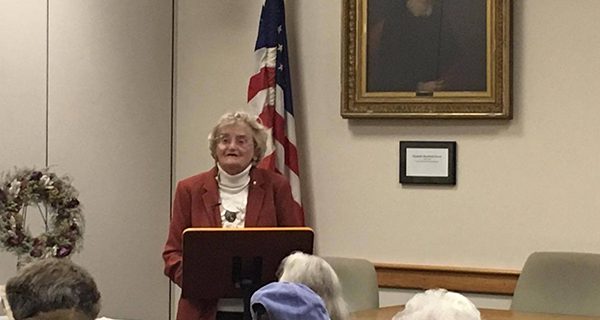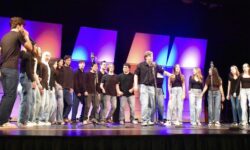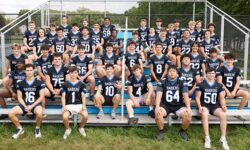[ccfic caption-text format="plaintext"]
By Katrina Margolis
Hometown Weekly Reporter
Phyllis Braun radiates an energy which rivals that of community members 20 years her junior. With an infectious laugh, an excellent sense of humor, and a palpable passion for the work she has accomplished, it’s no wonder Braun became so prominent as to attract attention from the White House.
Braun spoke at the Sherborn Town Hall to a group of local farmers and gardeners who were eager to hear a true pioneer in the field of organic farming speak. Despite all of her success, she is completely down to earth, naming the children of people in the room who have worked with her over the years.
Braun begins her tale by letting us know from the get-go that she was a city girl. “When my father retired he decided he would like to have a farm. He liked horse trails and such, so he bought a 200-acre farm in Holliston. It was quite a transition to say the least!”
Jarring as it might have been, Braun met her husband, Robert, down the road from her family’s new farm. Braun said, “Before we got married, we had to sit down and talk because he was 17 years older than I, and he was a farmer and I was a city person. He said, you know this life is not going to be what you’re used to. We got married and decided to take the risk.” The room broke into giggles at this. Braun’s delivery radiates an optimistic and hopeful outlook on life that has not diminished with age.
Robert was already a farmer, focusing primarily on livestock, but Phyllis decided she wanted to farm as well. They bought a farm that originated in the 1750s. “When you stepped on the farm, you got this 1750-feeling and I didn’t want to destroy that. I didn’t want a lot of modern greenhouses, and I didn’t want a lot of big tractors.” At the time, organic farming was a forgotten practice. Chemical-laden fertilizers were used in abundance. Braun marched forward undeterred and made do with what she had.
Before she began farming in the tradition of the 1750s farm, however, she bought a brand new 1951 truck. She said, “Before I did anything I went barreling down Commonwealth Avenue to show my city friends what I had bought.”
Braun planted vegetables and herbs, which were all farmed by hand – completely different from all the surrounding farms. While it wasn’t a new way of farming throughout history, it had long been an inactive practice, making it something new once again. Their farm was a source of refuge for many. The Massachusetts Horticultural Society caught wind of their practices and began to offer classes at their farm. Braun added, “As we grew through the years, we found we had some nurses come from the hospital who liked to sit in the fields and weed the rows. They worked on terminal cases so they’d like to drive out back and have a whole different outlook for the afternoon.”
The story of the morning was of course being contacted by the White House during the Reagan administration. “I had a friend that loved to play practical jokes. Robert went to bed, it was about 9 p.m. The phone rang and I heard this voice that said: ‘We want to order some wreaths, we’re from the White House.’ I’m thinking, ‘oh yeah, this is my girlfriend.’ All of a sudden I woke up to the fact that they were talking about textures and components and my girlfriend wouldn’t know these things! I was so excited I raced upstairs and woke Robert, and said, ‘Robert guess what?! We just got a call from the White House!’ And he said, ‘which White House?’”
An uproar of laughter emerges from her audience, and Braun smiles at the joy she is able to bring to the room. Her talk ends with a screening of a 1982 PBS special all about the Braun farm. Braun’s infectious pep and joviality inspire beyond the practice of farming. She is a living pioneer who honored the land as well as the tradition of farming.

























